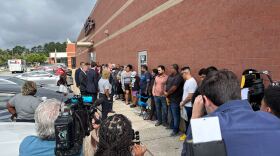A North Carolina legislative panel recommended banning police from using non-government issued IDs to verify people’s identity on Wednesday, potentially tossing out an instrument law enforcement uses to identify undocumented immigrants.
The proposal would repeal an exemption state law enforcement officials have from a law that prohibits governmental entities such local health departments from accepting IDs issued by independent organizations. Lawmakers created the exemption on the last day of the legislative session last year, at the urging of police officials across the state.
"I think we have enough struggle handling our population here in North Carolina with healthcare and education, rather than encouraging this particular illegal population to increase," said Debra Conrad, a Republican from Forsyth County.
The measure is part of state lawmakers’ efforts to tighten immigration laws. In recent years, state lawmakers have reduced local governments’ discretion in collecting information on immigrants’ status and have sought to increase requirements for businesses to verify workers’ status.
The bill authors are seeking to curtail the work of local non-profit organizations that have issued photo ID cards so people who have few other forms of identification can use them to receive some local services, said bill sponsor George Cleveland, a Republican from Onslow County.
Legislation approved last year banned judges, magistrates or government officials from accepting consular registration cards or non-government issued IDs.
The House Regulatory Reform Committee sent the proposal, House Bill 1069, to the Appropriations Committee.
Legislators voted last year to allow police to accept those IDs, after the North Carolina Association Of Chiefs Of Police and individual chiefs said that eliminating police’s discretion would significantly handicap officers’ work because they would be forced to book people into jail for not carrying photo identification.
On Wednesday, Doug Miskew, a lobbyist for the state Sheriffs’ Association, told lawmakers the association opposed the proposal because it would create obstacles for law enforcement officers’ daily work. Democratic legislators voiced similar opposition.
"Law enforcement continue to have the constitutional responsibility for ensuring that the entire community is safe, and it's very difficult to do that when you have people that you cannot identify," said Graig Meyer, a Democrat from Orange County.
The advocacy organization FaithAction International created an ID program more than three years ago and now helps issue cards in collaboration with local government and community leaders in nine counties.
In monthly ID drives, applicants are required to show documents in a process similar to the one used by the Division of Motor Vehicles, and law enforcement officers tell them the cards are valid only to verify their identity, said the Rev. David Fraccaro of FaithAction. Police departments uses the drives to help cultivate relationships with applicants, and it helps officers reach communities they otherwise have trouble reaching, Fraccaro said.
"A lot of this is a desperate attempt by the sponsors of this bill who don't like that the demographics of our communities are changing," Fraccaro said.









